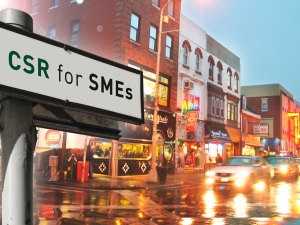Posts tagged ‘Small and medium enterprises’
CSR: What SMEs Need
June 12th and 13th in Berlin. Block your diaries these days for the first international conference called “Networking for Better Corporate Social Responsibility Advice for Small and Medium Sized Enterprises”, to which I have the honor to be invited, along with other 99 CSR consultants. This conference, funded by the European Commission, will be a forum for experts from all over Europe, specialized in sustainability in small and medium enterprises (SMEs). There will be discussions about how to provide better advice to European SME’s, and how we can contribute to better sustainability strategies in European SMEs.
CSR consultants are already sharing views via social media more and more often. However, it’s what SMEs do in terms of sustainability what is missed. Most often it’s big corporation language.
Consultants can act as a bridge between SMEs, exchanging experiences, know-how and points of view. This is the only way that»small» CSR best practices will be known not only in small, local circles, but also in wider platforms where they can be used by other organizations. A networking event like this has many challenges to face:
- Spread the news about CSR best practices in SMEs. Usually it is bigger corporations’ programs the only ones that get in the picture, leaving aside useful learnings and experiences made by smaller companies. The path towards sustainability for a SME can have completely different challenges and motivations. Very often what is good for a MNC is not necessarily good for a SME.
- Create a “best practices database” where both SMEs and consultants can contribute and profit from. Unfortunately, very often brilliant initiatives with great benefits have a limited audience. They should be accessible through this platform.
- European CSR needs to happen at smaller scale, or it won’t happen at all. According to the European Commission, “SMEs provide two out of three of the private sector jobs and contribute to more than half of the total value-added created by businesses in the EU”. European CSR programs have to take this into account if they really want to succeed. SMEs need an environment where they feel comfortable and free to discuss how they manage their CSR and sustainability strategies. This conference should be this ideal environment.
- Share, optimize, improve existing initiatives. For instance, there are dozens of self-diagnose tools that remain known only to few people and companies, mainly because they are local initiatives, or because they don’t have the proper forum where they can be analyzed and discussed. These initiatives should be shared, compared and complemented in order to avoid duplicities and create synergies.
- Find the best ways to help smaller companies become part of a sustainable supply chain. In some cases sustainability comes top-down: First, multinational companies decide to adopt a sustainable strategy and, later on, they demand the same from their suppliers (often SMEs). Small and medium businesses need to be prepared for that.
- Simplify things for SMEs: Speak their language, use their scale, be one of them.
- Turn CSR benefits into real value. Explain CSR to SMEs by using examples that bring added value to their activities. Don’t be abstract, get specific, talk about value creation.
- The conference should definitely go beyond consultant networking and facilitate networking between SMEs as well.
- Help companies find new businesses opportunities that are hidden behind the curtain. Tear this curtain down and help SMEs discover a whole new world of green, sustainable activities.
- The conference should prepare the shift from an economy based of the production of stuff to a new model based on added value and more services.This applies as well on SMEs.
Stay in tune, I will keep you posted!
CSR: A Survival Tool For SMEs
 CSR is a survival tool for small and medium enterprises (SME).
CSR is a survival tool for small and medium enterprises (SME).
With 20% votes, this is the main result from the poll that I published some weeks ago, and also my humble personal opinion. The rest of participants voted for options that could actually be considered as benefits that lead to the main one, namely:
- 18% think that CSR make smaller businesses more suitable to be part of the supply chain of conscious clients. As Jill Poet states, supply chain issues are becoming more and more important, and it is the way how sustainability can spread top-down, from bigger clients to smaller suppliers. CSR even opens the door to public contracts, especially now that the EU is emphasizing on sustainable criteria for public procurement.
- 14% voted that a sustainable strategy allows to optimise the use of resources, such as energy, etc. Here I would not only include energy costs but also transportation costs, logistics or office material.
- Also 14% think that CSR is a way to differentiate from competitors, and in uncertain times like these, where competition is rough and SMEs have to struggle every day, CSR can be the added value that is required to excel.
Intentionally, I didn’t include philanthropy, donations or any kind of sponsoring so maybe the poll was a little biased. Now I am curious about what would have been the result if I had included these options, which personally I do not consider a proper sustainability strategy.
However, I am surprised to see that the option connected with CSR as a self-knowledge tool (CSR to manage risks) was not picked by more participants, only 10% voted for it. Maybe because CSR as introspective analysis is more useful for complex structures, such as bigger corporations?
Last but not least, it was a little discouraging to see that CSR as gate to new products and services only got 6% of the votes. Are we really aware of the fact that sustainability can actually allow a company to reshape its portofolio? All kind of companies, not only SMEs, can develop sustainable goods addressed to certain market niches unexplored before. This is something we need to stress since I think it is an important benefit from CSR for SMEs.
I have to agree that CSR is the best strategy to survive in today’s changing world. and maybe it is so because of all the reasons stated above.
Thanks everyone for participating!
CSR: What’s In For Small Businesses?
Here are some prejudices concerning CSR/Sustainability and Small and Medium Enterprises (SME):
- Sustainability is for big companies
- Sustainability is too expensive
- Sustainability requires too many resources
- Sustainability is marketing, we cannot afford marketing campaigns
- We are far too few people, we don’t need social responsibility
These are some of the opinions I have to counterback when I explain sustainability to friends, relatives or even owners of small businesses. Most of them look at me skeptical and surprised. Their looks say «Small businesses have enough to do trying to survive in the current situation, they dont have time to think about social responsibility or sustainability». However, the expression on their faces changes as soon as I start talking about the benefits of a sustainable strategy for a SME. SME are in fact open for CSR, as I explained in a previous post.
Which one is the most important benefit for a SME that engages in CSR/Sustainability? Take the poll!
SMEs Are Open For CSR
There is this cliché that identifies Corporate Social Responsibility CSR with large, multinational corporations. Why is this so? Mainly because of following reasons:
- Many initiatives driven by small and medium enterprises (SMEs) do not have enough resonance, they stay in their own small circles.
- Most SMEs are not aware that they are already carrying out CSR measures of some kind.
- Last but not least, usually SMEs feel lost and do not know how and where to start implementing a CSR strategy. The jargon of CSR is often too entangled and complex for them.
However, not only SMEs can strongly benefit from a sustainable strategy, but sustainability is often part of their company culture, even if they are unaware of it. And one can not fully benefit from something you are not aware of.
The new ISO 26000 standard highlights the fact that it is a guidance addressed to all kind of companies, including smaller ones. However, no matter how useful this document will be, the smallest ones of the class won’t help feeling lost and lonely in the process. In Spain there are several initiatives to support the implementation of a CSR strategy in small and medium businesses:
- Transparencia is a program that has recently been launched by the Catalan chambers of commerce. Here, large companies, such as DKV, Mango or La Caixa act as mentors of smaller businesses (mainly their suppliers), guiding them through the process of becoming socially responsible. This initiatitive is supported by the Global Reporting Initiative.
- RS PYMES (PYMEs is the Spanish translation of SMEs) is a diagnose tool to check if a small company is socially responsible according to 7 different criteria: governance, human rights, environment, fair operating practices, customer issues, community involvement.
- In the NGO I am currently cooperating with, Economistas Sin Fronteras (Economists Without Borders), we are developing a training framework for small and medium companies (also including microenterprises). This project I am proudly leading aims to cooperate with towns and their local development agencies in order to reach SMEs more easily. Local administrations are usually felt as “closer” by citizens and small companies and maybe it’s also the best way to “teach” them the advantages of running their businesses in a more sustainable, socially responsible way. I will keep you updated about this one!
Are you aware of other initiatives especially addressed to SMEs? Why is it allegedly so difficult for SMEs to get the best out of CSR? Or is it not so difficult after all?


Debe estar conectado para enviar un comentario.